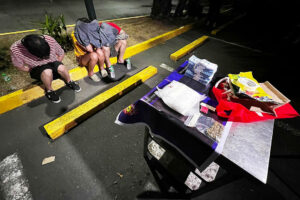
Philippines told to resolve issues before rejoining ICC
By John Victor D. Ordoñez, Reporter
THE PHILIPPINE government should resolve sovereignty issues involving the International Criminal Court (ICC) supposedly before rejoining the tribunal, a senator who enforced ex-President Rodrigo R. Duterte’s deadly drug war as national police chief said on Monday.
“If we are interested in rejoining, then we have to resolve issues that made us withdraw in the first place,” Senator Ronald M. dela Rosa told CNN Philippines.
“The ICC can only conduct its investigation if and when the country is not capable of conducting an investigation, or if the country is not willing to conduct one on alleged crimes against humanity,” he added, citing the Rome Statue, the treaty that established the ICC.
President Ferdinand R. Marcos, Jr. on Friday said his government is considering rejoining the ICC, which is investigating Mr. Duterte for alleged “crimes against humanity.”
“Should we return under the fold of the ICC? So that’s again under study,” he told reporters. “So we’ll just keep looking at it and see what our options are.”
Mr. Marcos had ruled out cooperation with the international court, saying its probe violates Philippine sovereignty given the country’s functional justice system.
Manila Rep. Bienvenido M. Abante, Jr., Party-List Rep., France L. Castro and Albay Rep. Edcel C. Lagman earlier filed separate resolutions urging the state to cooperate with the ICC probe.
The Senate would have to approve a decision to rejoin the court, Mr. Dela Rosa said.
Under the Constitution, a concurrence of two-thirds of the Senate’s members is needed to affirm international treaties, such as the Rome Statue.
The senator said he would be ready to face ICC investigators if the government decides to cooperate with its investigation.
“I cannot be in hiding, I will really face it,” Mr. Duterte’s former police chief said in mixed English and Filipino. “I will prepare myself psychologically, physically and mentally because I know I can overcome this case.”
In 2016, Mr. Dela Rosa as national police chief signed a circular that allowed police officers to visit the homes of suspected illegal drug pushers to persuade them to stop their illegal trade.
The Supreme Court in 2021 dismissed a petition seeking to void Philippine withdrawal from the tribunal, even as it ruled that international agreements need Senate concurrence.
It said the petition was moot since the ICC had accepted the Philippines’ withdrawal in 2019. Mr. Duterte withdrew Philippine membership in the international court a year earlier.
Last week, his daughter, Vice-President Sara Duterte-Carpio said allowing the ICC to probe crimes committed in her father’s deadly war on drugs would undermine the Philippine justice system.
The High Court said withdrawing membership does not remove liability for extralegal killings committed during the previous government’s anti-illegal drug campaign.
“Withdrawing from the Rome Statute does not discharge a state party from the obligations it has incurred as a member,” according to the March 16, 2021 ruling written by Senior Associate Justice Marvic M.V.F. Leonen.
“Consequently, liability for the alleged summary killings and other atrocities committed in the course of the war on drugs is not nullified or negated here.”
The ICC in January reopened its probe of the government’s deadly drug war, saying it was not satisfied with Philippine efforts to probe human rights abuses during the period.
The court rejected a Philippine plea to suspend its probe of the drug war in July, paving the way for the ICC prosecutor to later indict and order the arrest of local officials who aided the campaign.
The Hague-based tribunal, which tries people charged with crimes against humanity, genocide, war crimes and aggression, suspended its probe of Mr. Duterte’s deadly drug war in 2021 upon the Philippine government’s request.
Justice Secretary Jesus Crispin C. Remulla earlier told the United Nations (UN) Human Rights Council the Philippines could probe erring officials without the ICC’s help.
The Department of Justice (DoJ) has said the Hague-based tribunal is undermining the Philippine government’s sovereignty by continuing its probe.
It said the ICC should abide by the principle of complementarity, a concept of international law that ensures a state’s national authorities take precedence in handling criminal cases.
The Philippines has accepted 200 recommendations from the UN Human Rights Council, including investigating extralegal killings and protecting journalists and activists.
More than 30 member-states of the United Nations Human Rights Council in November last year urged the Philippines to do something about extralegal killings in connection with Mr. Duterte’s anti-illegal drug campaign.
The Philippine government estimates that at least 6,117 suspected drug dealers were killed in police operations. Human rights groups say as many as 30,000 suspects died.



